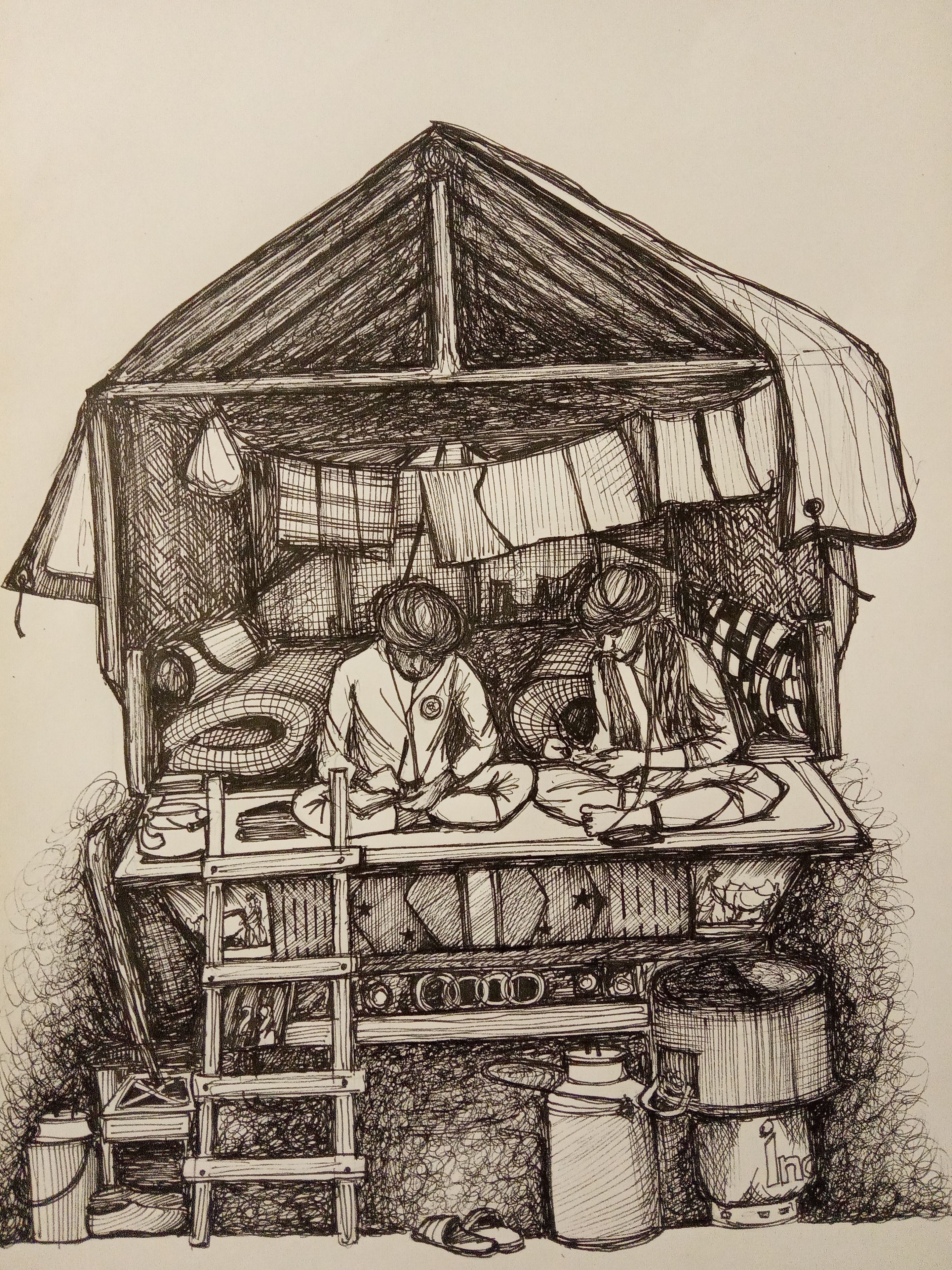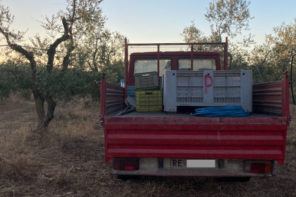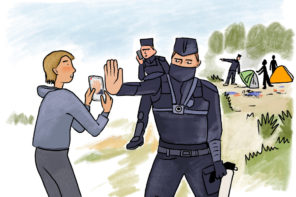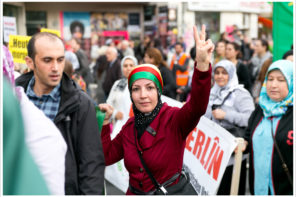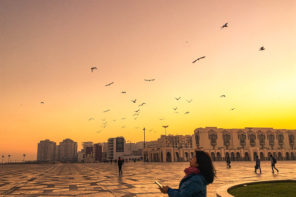By Dalene Swanson.
Who counts as human? Whose lives count as lives?… Loss and vulnerability seem to follow from our being socially constituted bodies, attached to others, at risk of losing those attachments, exposed to others, at risk of violence by virtue of that exposure. (Judith Butler 2004, 20)
Modernity as crisis
The development theorist, Jan Nederveen Pieterse (2010), asserted that development and crisis worked together to (re)produce each other; that modernist development was a condition of crisis. Global crises have regional specificity and situated historical realisations across the globe. As such, political conflict has its flashpoints in particular places where ecological, geo-political and economic vulnerabilities reveal levels of political intractability, and these particularised conflicts have real material effects on lives and deaths, landscapes, ecologies, communities, identities, histories, and future limitations and possibilities. But, they are also a reflection of the state of things at the core, at the very centre.
The wrenched historiographies of refugees of regional wars, local conflict, extreme poverty, and ecological devastation, exemplify the embodied materialising of such devastations, through the marking of land, bodies and space, in ways that effect the perforating of borders and shredding of global imaginaries of State and statehood. As such, these local or regional crises are nodal of larger complexes that are relationally intoned and inextricably intertwined.
In this sense, they are local emergences of global emergencies.
Crisis within crisis
Yet, global crisis doesn’t only reveal itself in ‘emergencies’ as flashpoints of conflict that often transmute into the realm of hyper-realities of social media, but can be part of the slow structural violences (Galtung, 1969) of the quotidian, an always-already ‘banality of evil’ (Arendt, 1964) of the everyday played out in local contexts of development devastation and economic, military and socio-political imperialism throughout the globe. The normalisation of crumbling social structures below the normalised, dominant discourses of economic development, and the always-already ruins of empire, are indeed their own crises of modernity hidden within: a crisis within crisis, a crisis of crisis.
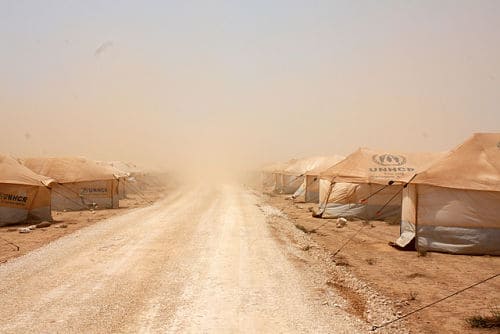
Photo by European Commission (flickr, CC BY-ND 2.0)
The Politics of Loss workshop
The British Council researcher links workshop in London on the Politics of Loss, from 7-9 September 2016, was an opportunity to connect, debate, challenge ideas and share research with our Turkish colleagues working on refugee, asylum and displacement issues in the Turkish / Syrian borderlands and Mediterranean. It was an opportunity to express moral outrage and collective commitments against severe injustice perpetrated against those displaced by Middle Eastern and North African wars and extreme poverty. And it was an opportunity to share in our mutual humanity as well. The undulations in the range of affective responses inflected the mood of the debates that were a constant recognition of the multiply-intertwined crises of injustice that is our current global political condition.
Ubuntu onto-epistemology
Recognising, as Bhambra (2016) does, that the crisis of postcolonial modernity is not a condition external to Euro-centred political structures, but a reflection of the crisis internal to the very structures that are the edifices of modernity themselves. Crisis as internally relational and endogenous to the systems of modernity that work to produce and are produced by its frames of war (Butler, 2009) is concomitant with the thinking that Archbishop Emeritus Desmond Tutu (who recently celebrated his 85th birthday) brings to the sub-Saharan onto-epistemology of Ubuntu, (and which I have focussed on in some of my own work: Swanson, 2007, 2009, 2010, 2012, 2013, 2014, 2015a, 2015b). In his book, No Future Without Forgiveness, reflecting his embrace of Ubuntu in leading the Truth and Reconciliation Commission in postapartheid South Africa, Tutu tells us:
“A person with ubuntu is open and available to others, affirming of others, does not feel threatened that others are able and good, for he or she has a proper self-assurance that comes from knowing that he or she belongs in a greater whole and is diminished when others are humiliated or diminished, when others are tortured or oppressed, or treated as if they were less than who they are.”
In our response to the plight of displaced Syrians and North Africans seeking refuge in Turkey and Europe, in Ubuntu terms we need understand that indifference to the dispossessed is the dispossession of our collective humanity, of what makes us human.

Photo by Beth Jusino (flickr, CC BY-NC 2.0)
No wall to lean on
Occasionally, there is something in a narrative related to us that holds our attention, even as it appears so insignificant. This was the case of a narrative shared by one of my Turkish colleagues at the Politics of Loss research workshop. She told us about her interview with an old Syrian man in a Turkish refugee camp. She expressed her surprise at the simplicity of his answer when she asked him: “what do you miss the most about your home back in Syria?” His answer was not a dramatic response as might have been expected under the circumstances. It was not reflective of severe trauma or extreme suffering. It was a simple suffering, borne from a long-endured tiredness: “Because we are housed in tents”, he related in his own words, “I miss being able to sit and lean against a wall”.
The Syrian refugee crisis is not a dramatic emergency played out from an external horizon, one that is impinging on an epistemologically coherent and sophisticated European modernity. The tired edifices of the global social imaginaries of empire and modernity are crumbling, or may even have been crumbling from their inception. They are a mark not of crises as external dramatic events or as external assaults on the centre, but of the quiet, simple, slow structural violence that is (at) the centre of things. We all, too, have no wall to lean on … but each other.
REFERENCES
Arendt. H. (1958). The human condition. Chicago, IL.: University of Chicago Press.
Bhambra, G.K. (2016). Postcolonial Reflections on Sociology. Sociology, 50(5), 960-966.
Butler, J. (2004). Precarious life: The power of mourning and violence. London: Verso Books.
Butler, J. (2009). Frames of war: When is this life grievable? London and New York: Verso.
Galtung, J. (1969). Violence, Peace, and Peace Research. Journal of Peace Research, 6(3), 167 – 191.
Nederveen Pieterse, J. (2010). Development Theory: Deconstructions/ Reconstructions. Thousand Oaks: Sage.
Swanson DM (2015a) Ubuntu, Indigeneity, and an Ethic for Decolonizing Global Citizenship. In: Abdi AA, Shultz L, Pillay T (ed.). Decolonizing Global Citizenship Education, Rotterdam: Sense Publishers, pp. 27-38. Available: http://hdl.handle.net/1893/22345
Swanson DM (2015b) Ubuntu, Radical Hope, and an Onto-epistemology of Conscience, Journal of Critical Southern Studies, 3, pp. 96-118. Available: http://hdl.handle.net/1893/22656
Swanson DM (2014) Frames of Ubuntu: (Re)framing an ethical education. In: Smits H, Naqvi R (ed.). Framing Peace: Thinking about and Enacting Curriculum as “Radical Hope”. Complicated Conversation, 44, New York: Peter Lang, pp. 49-63. Available: http://hdl.handle.net/1893/21314
Swanson DM (2013) Neoliberalism, education and citizenship rights of unemployed youth in post-apartheid South Africa, Sisyphus – Journal of Education, 1 (2), pp. 194-212. Available: http://hdl.handle.net/1893/19609
Swanson DM (2012) Ubuntu, African epistemology and development: contributions, contradictions, tensions, and possibilities. In: Wright HK, Abdi AA (ed.). The Dialectics of African education and Western discourses: counter-hegemonic perspectives. Black Studies and Critical Thinking, 21, New York: Peter Lang, pp. 27-52. Available: http://hdl.handle.net/1893/18543
Swanson DM (2010) Value in Shadows: A contribution to Values Education in our times. In: Lovat T, Toomey R, Clement N (ed.). International Research Handbook on Values Education and Student Wellbeing, Amsterdam: Springer, pp. 137-152. Available: http://hdl.handle.net/1893/18552
Swanson DM (2009) Where have all the fishes gone?: Living Ubuntu as an ethics of research and pedagogical engagement. In: Caracciolo DM, Mungai AM (ed.). In the Spirit of Ubuntu: Stories of Teaching and Research. Transgressions: Cultural Studies and Education, 48, Rotterdam: Sense, pp. 3-21. Available: http://hdl.handle.net/1893/18545
Swanson DM (2007) Ubuntu: An African contribution to (re)search for/with a ‘humble togetherness’, Journal of Contemporary Issues in Education, 2 (2), pp. 53-67. Available: http://hdl.handle.net/1893/18535
Tutu, D. (1999). No future without forgiveness. New York: Doubleday.
Featured image by Rebecca Perry (flickr, CC BY-NC-ND 2.0)





